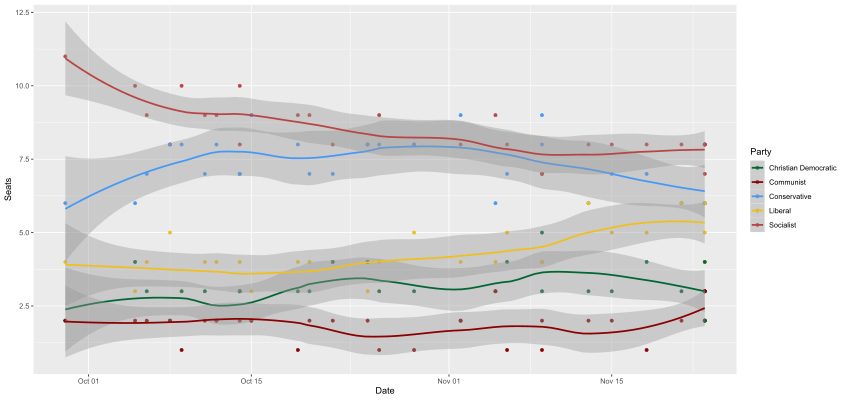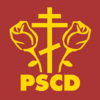Juclandian parliamentary election, 2012
| |||||||||||||||||||||||||||||||||||||||||||||||||||||||||||||||||||||||||||
All 25 seats to the Assembly of Deputies 13 seats needed for a majority | |||||||||||||||||||||||||||||||||||||||||||||||||||||||||||||||||||||||||||
|---|---|---|---|---|---|---|---|---|---|---|---|---|---|---|---|---|---|---|---|---|---|---|---|---|---|---|---|---|---|---|---|---|---|---|---|---|---|---|---|---|---|---|---|---|---|---|---|---|---|---|---|---|---|---|---|---|---|---|---|---|---|---|---|---|---|---|---|---|---|---|---|---|---|---|---|
| Turnout | 90.55% | ||||||||||||||||||||||||||||||||||||||||||||||||||||||||||||||||||||||||||
| |||||||||||||||||||||||||||||||||||||||||||||||||||||||||||||||||||||||||||
| |||||||||||||||||||||||||||||||||||||||||||||||||||||||||||||||||||||||||||
The 2012 elections for the Assembly of Deputies of Juclandia were held on the 23rd of December, 2012. All 25 seats were contested in the election, through a party-list proportional representation voting system.
In the polls, the Socialist Christian-Democratic Party and the Democratic Party competed for a plurality, while support for the New Democracy - Christian-Democratic party has greatly decreased. The polls also showed a tiny increase in support for the Communist Party and the Liberal Alliance.
The elections saw a plurality for the Socialists, which formed a coalition with the Liberal Alliance and the Communist Party. The designated Prime Minister was Teddy Populescu
Background
After the general election of December 2011, which has seen a center-right coalition government for the first time in Juclandia's history, the new Cabinet headed by the Democratic Prime Minister Iepurica Democrescu has started talks for a constitutional reform. After the coalition broke in May 2012, Iepurica Cabinet has gone into a minority, being stripped of the possibility of making any significant reform. The constitutional reform talks have then been taken over by the left-wing opposition National Workers' Bloc, which successfully reached an agreement on the revised constitution with the Government. At the April Council of State elections, the National Workers' Bloc have gained a large plurality, and Gori Jucărescu won the presidential elections with 46.4% of the vote. At the same time, a national unity government by the Democratic Party, the Liberal Alliance and the National Workers' Bloc has been formed. In September 2012 the National Reform Party was merged into the Socialist Christian-Democratic Party, and the National Workers' Bloc ceased to exist, meaning that the Communists and the Socialists will compete separately in the elections.
Participating parties
Every registered party in Juclandia may participate in the elections, if the party presents a list of minimum 15 candidates by the 15th of November. The government of Iepurica Democrescu has decided to change the system from mixed-member proportional to party-list proportional voting.
Pre-election agreements
After the break-up of the National Workers' Bloc in October 2012, there has been no formal coalition or agreement of alliance created, making this the first election in Juclandia where individual parties compete without any formal mutual support agreement between them. However, the Socialists and the Communists have reached an informal agreement where they have promised to form a government coalition if they gain a majority together. The Liberal Alliance has stated that it'd be part in any coalition that serves best the interests of the Juclandian people, while the Democratic Party wishes to make itself a coalition where it would be the major party. The leadership of the Christian Democrats has declared that it wishes only to take part in a center-right coalition government.
Opinion polling

Opinion polling for the December 2012 general elections. Note that the results are shown in number of seats and not in percentage.
| Polling Firm | Date | Socialist | Conservative | Liberal | Christian Democratic | Communist |
|---|---|---|---|---|---|---|
| December 2011 election results | 23/12/2011 | 4+3[2] | 6 | 5 | 6 | 4 |
| Royal SA | 29/09/2012 | 11 | 6 | 4 | 2 | 2 |
| Royal SA | 05/10/2012 | 10 | 6 | 3 | 4 | 2 |
| DEMSA | 06/10/2012 | 9 | 7 | 4 | 3 | 2 |
| DEMSA | 08/10/2012 | 8 | 8 | 5 | 2 | 2 |
| Royal SA | 09/10/2012 | 10 | 8 | 3 | 3 | 1 |
| Royal SA | 11/10/2012 | 9 | 7 | 4 | 3 | 2 |
| DEMSA | 12/10/2012 | 9 | 8 | 4 | 2 | 2 |
| Elefteria | 14/10/2012 | 8 | 7 | 4 | 3 | 3 |
| Royal SA | 14/10/2012 | 10 | 7 | 3 | 3 | 2 |
| Elefteria | 15/10/2012 | 9 | 9 | 3 | 2 | 2 |
| DEMSA | 19/10/2012 | 9 | 8 | 4 | 3 | 1 |
| Royal SA | 20/10/2012 | 9 | 7 | 4 | 3 | 2 |
| Royal SA | 22/10/2012 | 8 | 7 | 4 | 4 | 2 |
| DEMSA | 25/10/2012 | 8 | 8 | 3 | 4 | 2 |
| Elefteria | 26/10/2012 | 9 | 8 | 4 | 3 | 1 |
| Royal SA | 29/10/2012 | 8 | 8 | 5 | 3 | 1 |
| DEMSA | 02/11/2012 | 8 | 9 | 4 | 2 | 2 |
| ORIPOP | 05/11/2012 | 9 | 6 | 4 | 3 | 3 |
| Royal SA | 06/11/2012 | 8 | 7 | 5 | 4 | 1 |
| NeaDemos | 09/11/2012 | 7 | 8 | 4 | 5 | 1 |
| DEMSA | 09/11/2012 | 7 | 9 | 4 | 3 | 2 |
| Elefteria | 13/11/2012 | 8 | 6 | 6 | 3 | 2 |
| Royal SA | 15/11/2012 | 8 | 7 | 5 | 3 | 2 |
| Elefteria | 18/11/2012 | 8 | 7 | 5 | 4 | 1 |
| Royal SA | 21/11/2012 | 8 | 6 | 6 | 3 | 2 |
| DEMSA | 23/11/2012 | 8 | 8 | 4 | 3 | 2 |
| Royal SA | 23/11/2012 | 8 | 6 | 5 | 4 | 2 |
| Elefteria | 23/11/2012 | 7 | 6 | 6 | 3 | 3 |
| ORIPOP | 23/11/2012 | 8 | 6 | 6 | 2 | 3 |
| 2012 election results | 23/12/2012 | 7 | 6 | 5 | 3 | 4 |
- NOTE: 23 November was the last legal day for surveys to be conducted.
Results
| Parties | Results | ||||
|---|---|---|---|---|---|
| Seats | % | Votes | % | ||
| Socialist Christian-Democratic Party | 7 | 28% | 43 | 26.4% | |
| Democratic Party | 6 | 24% | 38 | 23.3% | |
| Liberal Alliance | 5 | 20% | 31 | 19.0% | |
| Communist Party of Juclandia | 4 | 16% | 28 | 17.2% | |
| New Democracy-Christian Democratic | 3 | 12% | 23 | 14.1% | |
| Total | 25 | 100% | 163 | 100% | |
| Expected voters (turnout) | 180 | 90.55% | |||
References
- ↑ In the National Workers' Bloc, which competed as a united electoral alliance in the 2011 election, the Socialist Christian-Democratic Party got 4 seats and the National Reform Party got 3
- ↑ In the National Workers' Bloc, which competed as a united electoral alliance in the 2011 election, the Socialist Christian-Democratic Party got 4 seats and the National Reform Party got 3




